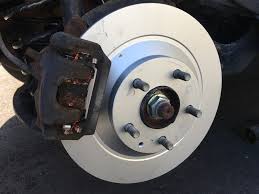Every time you step on the brakes, your car experiences an incredible amount of friction. On top of that, there are all kinds of tiny parts involved in the braking process, which means there’s a lot that can go wrong to cause squeaking brakes.
To understand what causes this, we need to take a closer look at how brake pads work—and, more importantly, why they begin to squeal in the first place.
Improperly Installed Brake Pads
Incorrect assembly of the brake pads can cause squeaking under gentle braking. If the brake pad’s friction material is not properly seated on the backing plate, then it will likely rattle or squeak when it vibrates against the rotor.
If your brakes are fairly new and you’re just driving home from a visit to your local auto repair shop, it could be that one of your brake pads’ friction material has been installed backwards. Brake shoes and pads often have a front and rear side marked with arrows. Applying some anti-squeal compound to this area may help combat this issue if you have time before you need to drive again.
Over-Older Pads
As your brakes wear down, the thin layer of friction material that wraps around the brake pad wears down as well. Eventually, only the metal part of the brake pad is left. When this happens, the metal part of your brake pad will rub against the rotor and create a squeaking noise.
If you have gone too long without replacing your brake pads, you may have damaged other components in your braking system. If you hear a loud noise when applying pressure to your brakes, take it to a mechanic immediately for repairs.
Wet Weather
Wet brake pads can cause squeals because the fluid film that separates the pad from the rotor gets dispersed by the water. This does not happen with dry brakes, but a turn in wet weather is enough to dry out your pads. The solution? Try to avoid getting your brakes wet.*
Bad Shocks or Struts
If your shocks or struts are worn, then the squeaking noise is a direct result of the wear items.
When your shocks and struts are bad, it will affect how well your brakes perform. Regardless of why they are worn, getting them replaced will not only help you stop quicker and more safely, but it should also alleviate any squeaking noises that may be occurring as well.
Worn Rotors
Worn rotors are a common cause of squeaking brakes.
Rotors rust: Over time, the brake rotors can rust and develop a hard, rusty layer on the surface. This reduces the friction generated by the brakes and results in squealing noises. Rotors wear out: When brake pads are applied hard (such as when driving down a steep hill), they lose material and wear down over time. When this happens, it may result in a gap forming between the rotor and pad surfaces that causes squeaking or squealing sounds. The same thing can happen when someone slams on their brakes or drives with worn-down brake pads for too long before replacing them. Rotors warp: Brake rotors can warp if they get too hot during braking or if they sit within your wheel assembly without being used for long periods of time. Warped rotors usually lead to squeaky brakes because warping creates an uneven surface that makes it harder for your brakes to do their job.
Brakes squeak because of metal rubbing metal. This can happen in a variety of ways.
To make a long story short, brakes squeak because of metal rubbing metal. This can happen in a variety of ways, but no matter the cause, the solution is the same: wet and dry sanding with 400 grit sand paper, followed by applying brake grease.


